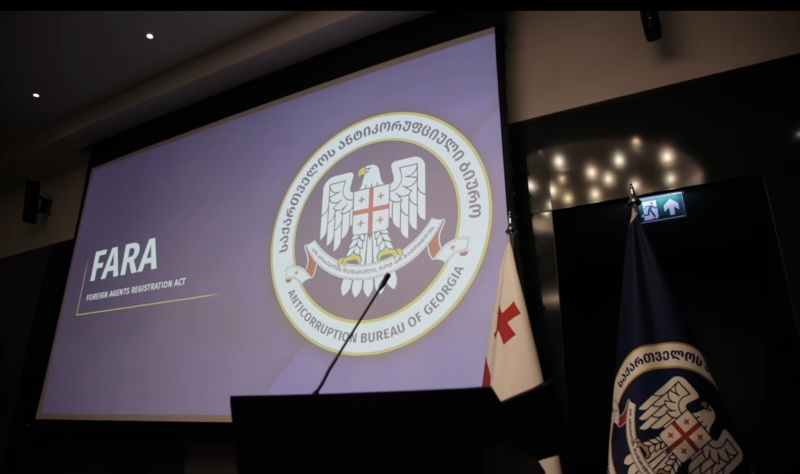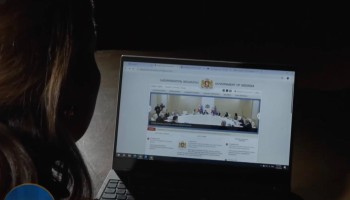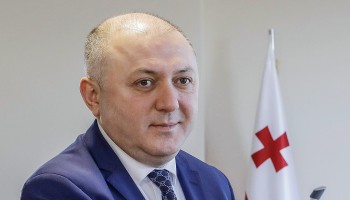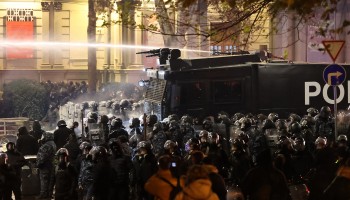Georgian independent media and civil society groups have vowed to defy a controversial new foreign agents law that came into force Saturday, warning that the legislation will be used to silence criticism of the authorities.
The law requires individuals and entities acting on behalf of foreign principals to disclose their funding and activities. Officials from the ruling Georgia Dream party insist the law mirrors the U.S. Foreign Agents Registration Act (FARA), which is intended to increase transparency around foreign influence.
In the case of Georgia, the concern is that the law lacks the legal safeguards of its American counterpart and could be misused to silence critics the way the Kremlin has in Russia.
Georgian Dream rushed the law through parliament amid mass demonstrations, initially ignited by the government’s decision to halt EU membership talks until 2028. Georgian security services have been accused of violently suppressing the protests.
According to the Georgian government, the new legislation is necessary to enforce compliance with the existing “foreign agents” law, which was largely defied by civil society with no consequences. Non-government organizations and media simply refused to register as “organisations pursuing the interests of a foreign power,” as the law required them to do. The new law is stricter and prescribes that those who refuse to register as foreign agents could face criminal sanctions.
But despite the risk of prosecution, several Georgian independent media outlets and civil society groups have told OCCRP that they will nevertheless refuse to register under the new law — with some pledging to challenge Georgia’s version of FARA in court.
Lika Zakashvili, editor-in-chief of the independent news outlet Publika.ge, said that the publication expects the ruling Georgian Dream party to use a “bad faith interpretation” of the law to target free media. “We intend to fight — using both local and international legal instruments — and we will not register,” she told OCCRP.
“We do not operate under anyone’s instructions, nor do we carry out anyone’s orders,” said Saba Brachveli, a lawyer for the Tbilisi-based Civil Society Foundation, which also refuses to register. “We serve only the interests of the people,” he added.
The online news site Mtis Ambebi also plans to defy the law, according to its editor-in-chief, Gela Mtivlishvili, who told OCCRP that the foreign agent label is “degrading to our dignity and discrediting.” Mtis Ambebi is one of three organizations — including OCCRP’s Georgian member center Studio Monitori — that have launched a legal challenge against the law at Georgia’s Supreme Court, Mtivlishvili added.
Kamilla Mamedova, the head of local community radio station Radio Marneuli, also remains defiant, despite uncertainty about what non-compliance with the “repressive” law will mean for her organization. “We don’t know how much we can endure,” she said. “[But] we will stay until the end — as long as we have the means to give our community access to information, alternatives, and different viewpoints.”
Enforcement of the Georgian FARA law rests with Georgia’s Anti-Corruption Bureau, which will refer cases of non-compliance to law enforcement agencies and the courts for possible sanctions, including administrative or criminal penalties.
Speaking on Monday to the Georgian Public Broadcaster about the new legislation, Georgia’s human rights ombudsman Levan Ioseliani said that it is “not relevant to debate its democratic credentials,” but that the law would be monitored on an ongoing basis for potential rights violations.
In a joint statement on Saturday, the EU’s top diplomat Kaja Kallas and the European Commissioner for Enlargement Marta Kos warned that the new Georgian law “marks a serious setback for the country’s democracy,” citing a raft of legislative changes targeting Georgia’s free press.
“Alongside recent laws on broadcasting and grants, it represents another aggressive step by Georgian authorities to suppress dissent, restrict freedoms, and further shrink the space for activists, civil society, and independent media,” the EU officials said.




